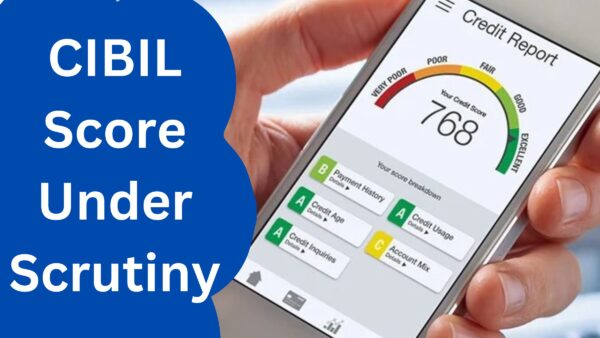Business News
Rising Concerns Over CIBIL Score: What You Need to Know About the Issue?

In today’s fast-paced world, a good CIBIL (Credit Information Bureau India Limited) score plays a pivotal role in determining an individual’s financial health and eligibility for loans, credit cards, and mortgages. However, rising concerns over the accuracy, transparency, and impact of CIBIL scores are causing distress among borrowers and financial experts alike. As more people rely on their CIBIL score to gain financial leverage, understanding the complexities and challenges associated with it is becoming increasingly important.
1. What is a CIBIL Score?
A CIBIL score is a three-digit numerical value ranging from 300 to 900, calculated by CIBIL (now a part of TransUnion CIBIL). It reflects an individual’s creditworthiness, which is based on their credit history and payment behavior. The higher the score, the more likely one is to receive favorable loan terms and lower interest rates.
Factors Influencing CIBIL Score:
- Payment History: Timely repayment of loans and credit cards.
- Credit Utilization Ratio: Percentage of credit used against the available credit limit.
- Length of Credit History: Longer credit histories often result in a better score.
- Credit Mix: A balanced mix of credit types, such as personal loans, credit cards, and mortgages.
- Recent Inquiries: Frequent loan or credit card applications can reduce the score.
2. Why Are CIBIL Scores Gaining Attention?
As financial markets become more accessible, more individuals are now seeking loans and credit cards to fulfill personal and business needs. Financial institutions, in turn, are relying on CIBIL scores to evaluate the risk associated with lending. The growing dependence on this score has brought the following concerns to the forefront:
Inaccuracies and Errors in Credit Reports:
One of the primary concerns is the accuracy of the CIBIL score. Many consumers report discrepancies in their credit reports, such as payments not being reflected correctly, debts not being updated, or fraudulent activities that negatively impact the score.
Impact on Loan Approvals:
A low CIBIL score can lead to loan rejections or approvals with high-interest rates, significantly affecting one’s financial planning. Even a small dip in the score can cause delays in securing credit or make one ineligible for financial products altogether.
3. Challenges Faced by Consumers:
The increasing reliance on CIBIL scores has led to several challenges that consumers face when dealing with their creditworthiness:
Lack of Transparency:
Despite being a crucial metric, the factors affecting CIBIL scores are often not fully explained to the general public. Many consumers are unaware of the nuances of their score, such as how payment delays, even those less than 30 days, can severely impact it.
Delayed Updates:
In some cases, even after settling old dues or resolving issues with creditors, the updated status may not reflect immediately on the credit report. This delay in updating the score can affect an individual’s ability to get loans or credit cards in the short term.
Low CIBIL Score for First-Time Borrowers:
New borrowers or individuals who haven’t used credit products are often left with a low or nonexistent CIBIL score. This puts them in a dilemma, as they cannot establish a good score without using credit, but at the same time, they are penalized for not having a score in the first place.
4. How Can Consumers Address CIBIL Score Issues?
While there are significant concerns about the CIBIL score system, there are ways consumers can mitigate these issues and improve their score:
Regularly Monitor Your Credit Report:
One of the most proactive steps to address CIBIL concerns is to regularly check your credit report for errors. You can request a free report once a year from CIBIL, and any discrepancies can be disputed and corrected.
Timely Payments:
The best way to maintain a healthy CIBIL score is by making timely payments for all credit obligations. Set up reminders or automated payments to ensure you never miss a due date.
Avoid Multiple Inquiries:
Frequent applications for credit products can negatively impact your CIBIL score. Instead, research thoroughly and apply for credit only when necessary.
Build Credit Gradually:
If you’re new to credit, start by applying for a low-limit credit card and use it responsibly. Over time, as your repayment history builds, your CIBIL score will improve.
5. The Future of CIBIL Scores: Potential Reforms and Changes
As concerns over the CIBIL score system rise, there is growing pressure on credit bureaus and regulators to address these issues. Experts suggest the following reforms to improve transparency and fairness:
Enhanced Transparency:
Credit bureaus may introduce clearer guidelines on how scores are calculated, offering consumers more insight into the metrics that determine their scores. Simplifying this process could help borrowers better understand how to improve their creditworthiness.
More Comprehensive Credit Scoring:
There is a growing call for incorporating alternative data sources, such as rent payments and utility bills, into the credit scoring system. This could benefit those without a significant credit history, such as young people or those who rely on cash-based transactions.
Faster Dispute Resolution:
To resolve errors more efficiently, the dispute resolution process could be accelerated, allowing consumers to clear up inaccuracies quickly and get their scores updated in real time.
CIBIL scores are a fundamental part of the financial landscape, but the growing concerns surrounding their accuracy, transparency, and impact on consumers are undeniable. As borrowers become more aware of these challenges, the need for systemic improvements becomes apparent. For consumers, staying informed about the factors that affect their credit scores and taking proactive steps to monitor and improve them can help navigate these complexities. With potential reforms on the horizon, the future of CIBIL scores may become more consumer-friendly, fostering a more equitable and transparent financial ecosystem.
